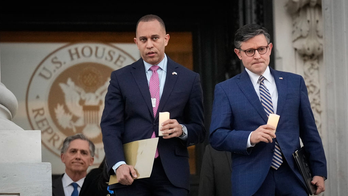Michigan Gov. Rick Snyder declared a financial emergency in Detroit on Friday, pushing the city closer to becoming the largest in the country to have state control over its finances.
Snyder told The Associated Press that his decision on whether to appoint an emergency manager will come after the city's 10-day appeals process, but that Detroit will be "on the path" to having the state oversee its books if he turns down any such appeal. He also said he already has a candidate in mind for the position, but declined Friday to release details.
Mayor Dave Bing's office already has been notified of a March 12 hearing date, Snyder said.
Snyder called it a "sad day" but also a day of "optimism and promise because it's time to start moving forward and solving these problems."
Detroit, a city once renowned for its manufacturing might, faces a $327 million budget deficit, more than $14 billion in long-term debt and persistent cash flow issues. Friday's announcement was all but guaranteed after a review team reported to Snyder on Feb. 19 that Detroit was in a financial emergency and needed the state's help to emerge from it.
"Citizens are not getting the services they deserve and need," Snyder said during a midday Friday public forum. "Public safety, lighting, transportation -- all those areas need help and it's time to call all hands on deck and say let's all work together."
He also said there is no "big bailout coming" from the state. Emergency managers have the power under state law to develop financial plans, renegotiate labor contracts, revise and approve budgets to help control spending, sell off city assets not restricted by charter and suspend the salaries of elected officials.
"The role here is to be that supportive partner and to work on projects where we could really make a difference," the governor said.
Bing said Thursday he has thought since taking office in 2009 that some kind of outside help is needed to address the city's finances.
"I'm more interested, instead of fighting Lansing, in working with them," the first-term mayor said.
Detroit would be the largest city in the United States to come under state oversight, according to James Hohman, assistant director of Fiscal Policy at the Mackinac Center for Public Policy, a free-market think tank based in Midland, Mich.
A review team first looked into Detroit's books in December 2011, but stopped short of declaring a financial emergency. A second team began to pore over the city's finances again this past December. That report said the accumulated deficit as of June 30, 2012, would have topped $900 million if Detroit leaders in previous years had not issued bonds to pay some bills.
The city's long-term liabilities -- including underfunded pensions -- now total more than $14 billion. And in recent months, Detroit has relied on bond money from an escrow account to meet its dwindling cash flow needs and to pay city workers.
The review team also said that because of Detroit's cash deficit, the city would have had to either increase revenues or decrease expenditures -- or both -- by about $15 million per month for three months starting in January to "remain financially viable."
Bing said Thursday that Detroit's situation wouldn't "change dramatically any time soon."
"There are things Lansing can do to help to get us out of this situation faster than we can do it by ourselves," he said.
Detroit would be the sixth -- and largest -- city in Michigan to come under state oversight. Pontiac, Flint, Ecorse, Allen Park and Benton Harbor already have managers, as do public school districts in Detroit, Highland Park and Muskegon Heights.




